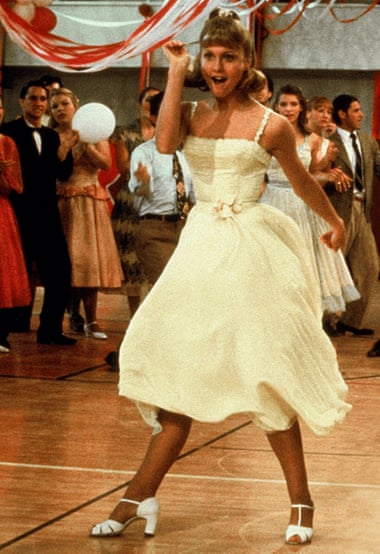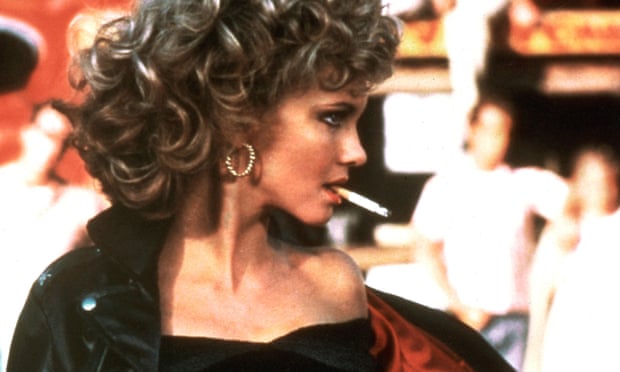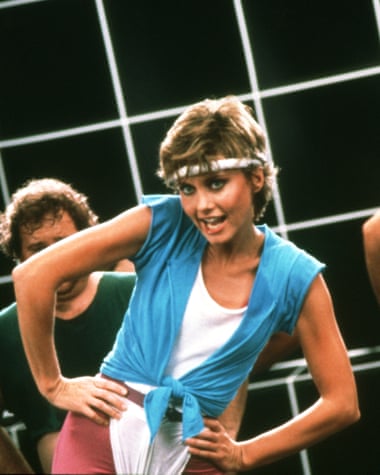
The death of Olivia Newton-John this week was followed by an avalanche of tributes from celebrities and fans on social media. And the image accompanying most of the posts of was Newton-John as Sandy Olsson in the last scene of her signature 1978 film, Grease. Wearing tight black trousers, an off-the-shoulder black top, red mules and biker jacket, with her hair teased and a cigarette in hand, she gazes into the eyes of co-star John Travolta as Danny Zuko.
Released nearly 45 years ago and set in the 1950s, Grease remains part of the zeitgeist – with Newton-John’s now-infamous makeover and final outfit central to that. Fans paid tribute on Twitter, with one writing that the outfit “has shaped my fashion style since I was about three” and another saying “the world changed” after seeing it. The get-up is so recognisable that it is a popular choice for costume parties. Celebrities including Gigi Hadid, Jessica Simpson and Hailey Bieber have been Sandy for Halloween in recent years.
The continued impact is partly thanks to the outfit’s place in the film. In the final scene, Sandy – previously painted as a square in the cutesy poodle skirts and pastel colours of the 1950s – is transformed into a “bad girl” in figure-hugging black and leathers. “It seems to have a way of representing [the] dreams of everyone,” says Oliver Gruner, who edited the 2019 book Grease is the Word. “[Sandy] transforms from a shrinking violet … [It’s an example of] just totally becoming a different character, remaking yourself.”
“It was very clear from the beginning that she would have to change,” says Grease’s costume designer, Albert Wolsky. “The idea was easy because she had been so girlish, so you had to go the other way – totally tight and sophisticated.” While Wolsky made Newton-John’s outfits for most of the movie, the infamous top and trousers were bought vintage. As Newton-John relays in her 2019 autobiography, the zip was broken and she was sewn into the trousers each morning. “They were so old, and there was just one pair, so there was no room for error,” she wrote. “One rip and disaster.”
But there has been feminist critique of Sandy’s transformation, because it is she, not Travolta’s Danny, who changes – he does turn up in a geeky cardigan to show his love, but it is rapidly ditched when he sees the all-new Sandy. Colin Richmond, costume designer for the London stage show Grease the Musical, is uncomfortable with this element. “It feels wrong to me that someone should change themselves for another person to gain their affection,” he says. But, he says, it also provides dramatic effect. “Perhaps there’s something so at odds and so polar opposite about Sandy’s final look that gives us a jolt. Maybe that’s all part of its greatness.”

Gruner says humour is all-important. “You could read that final scene as her moving from one stereotype to [another],” he says. “[But] Newton-John plays that role with a tongue wedged firmly in her cheek … [The way] she looks to her friends for directions on how to drop the cigarette, for example.”
Kate Bailey, a senior curator at the V&A in London, who works on costume, believes the outfit was, at the time, a glimpse into the future. “It throws us into the bold, empowered dressing of [the 1980s],” she says. “[The 70s] was a time when women were wearing pinafores and flares. [This outfit] is marking a moment in the story of Grease, but it’s also a fashion statement. It really goes ahead of its time.”
The simplicity of the outfit – black trousers, black top, red lipstick – has assisted its staying power, says Bailey. “It is so bold and classic and simple and sexy that many people can wear it,” she says. “It’s so sleek and [anyone] can afford to [replicate] it.” Wolsky says it was crucial that the transformation was total. “She had to have certain hair, makeup,” he says. “It’s all a piece. If she’d had the same hair [as the rest of the film] and that costume, it wouldn’t work.”

After her death, other style moments from Newton-John’s career are likely to be rediscovered. The headband and leotard worn for her 1981 hit song Physical will no doubt appeal to a generation raised on athleisure, while the spacey disco look of the 1980 film Xanadu already has a cult following. But, says Bailey, “I don’t think it will ever eclipse Grease. It’s the character of Sandy. That costume, that breakout moment, that reaction by Danny.”
Wolsky, a costume veteran whose career spans six decades, says it remains part of his reputation. “That will be on my tombstone, that’s for sure,” he says. “I’ve done Sophie’s Choice, I won an Academy Award for All That Jazz, but this is the one that I’m that I’m known for.”
Newton-John sold the jacket and trousers for $405,700 (about £335,000) at auction at Julien’s in 2019 to raise money for her cancer centre. The trousers were bought by Sara Blakely, the founder of Spanx, and they are framed and displayed on the wall at the company’s offices. An anonymous fan bought the jacket and then given back to Newton-John as a gift. “She called the jacket her ‘baby’ and kept it all her career,” says Martin Nolan, executive director of Julien’s. He organised the surprise of giving the jacket back. “She thought she was getting a puppy [and] opened a big pink box,” he says. “I have never heard such shrieks of joy.”



